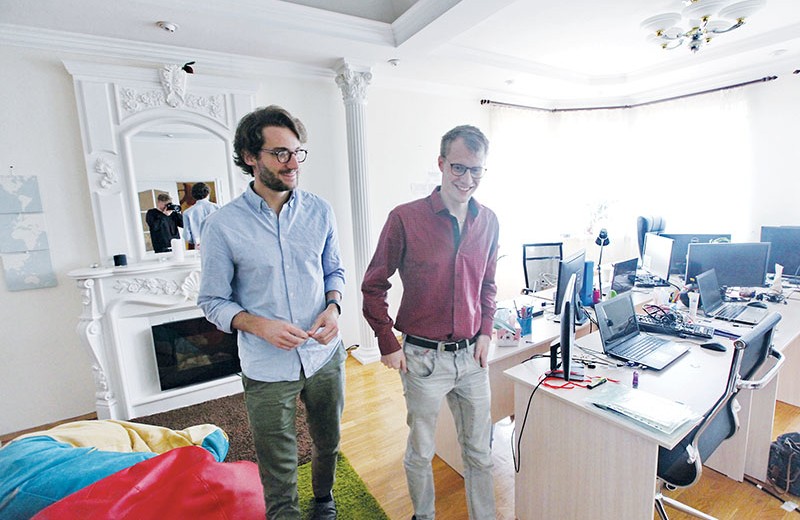Andreas Flodström and Gustav Henman, two young Swedish entrepreneurs, came to Ukraine in September 2012 knowing "OK Russian" and with the shared goal of setting up a business in Eastern Europe "from scratch."
That same year they set up a software development company in Poltava, a provincial capital of 290,000 people some 350 kilometers east of Kyiv. They started an information technology business in Ukraine because the country has the reputation of being a regional leader in this sector.
“We had planned to do something in Eastern Europe before we decided to run an IT company in Ukraine,” Flodström told the Kyiv Post during an interview in April. “IT is a tool – it’s the best way to build opportunities in this part of the world. (It’s) the lowest-hanging fruit.”
They called their company Beetroot – one of the main ingredients in traditional Ukrainian dishes such as borsch soup – perhaps reflecting the fact that they had become “emotionally attached to the country,” the pair told the Kyiv Post.
The business grew quickly, soon employing 90 programmers, and expanding to become an educational center for dozens of Ukrainians, running classes not just in Poltava, but in Kyiv and Odesa as well.
“We’re a market-oriented company that has been satisfying the growing demand for IT specialist in the world. And we’ve done well,” Flodström said. “But giving people more opportunities and helping to build up the Ukrainian middle class is now a stronger motivation for us.”
Henman added that the income produced by the company has allowed its management to set social goals, which it hopes will have a big impact later on.

In 2014, the businessmen established the Beetroot Academy to teach Ukrainians programming languages such as Java Script and PHP, and other skills such as creating websites with WordPress, and even learning English. The company’s offline four-month, four-time-per-week course equips students with the knowledge they need to build websites “from zero,” the businessmen said.
With the help of the Swedish embassy, which agreed to fund the first students of the academy and the development of a curriculum for it, they selected 12 “test” students from 200 applicants, and put them through the study program the company had designed.
At the end of the course, Beetroot employed half of the test students.
Having developed some expertise in providing IT education, the academy next took part in a tender held by the United Nations Development Program (UNDP) and the Japanese government to provide education to Ukrainians who have been internally displaced by the war in the east of the country.
The Beetroot Academy won the tender, and about 400 IDPs soon submitted applications to attend its first courses. After testing and interviewing many of the initial applicants, who ranged in age from 17 to over 50, the academy selected 60 of them – half to attend courses in Poltava, and the other half in Odesa.
“All of the students had quite similar backgrounds – and all of them had had to leave their homes,” Flodström said. “It was difficult to choose 60 out of 400, but in the end we took the most highly motivated people.”
The IDPs all went through the same program of study, which was “very much focused on the practical,” the businessmen said. Ten went on to become workers for Beetroot, while others started either teaching the next crop of students in the academy, or working as freelancers.
Flodström said Ukrainian universities are quite good at teaching theoretical knowledge, but lacking when it comes to teaching students “how to actually work.”
Beetroot’s own program gives students the tools they need to do a real job – the goal is to end up with students who can make good websites when they finish the course, he said.
“Hence, 70 percent of the trainees end up being employed,” Henman added.
Beetroot Academy uses “flipped classroom methodology,” in which “lectures” are attended at home, and “homework” is done in class – students typically watch short video lectures before a lesson, and then engage in practical work while in class.
From their experiences in providing free courses, Beetroot’s owners realized that IT education in Ukraine is in high demand. Although the free course has now ended, they have continued to develop new courses and start up classes in new locations, but now charge $400 per month for studies. Henman and Flodström say they offer 24 places for students, and on average they have four applicants per place.
However, they say, the Beetroot Academy only earns enough to cover its costs – and they still choose only the most motivated applicants.
“We try to find people who are clearly interested,” Flodström said. “Because if you’re interested and motivated, you should be able to google around and find out where the stumbling blocks are by yourself.”
Kyiv Post staff writer Denys Krasnikov can be reached at krasnikov@kyivpost.com. The Kyiv Post’s IT coverage is sponsored by Beetroot, Ciklum, Steltec Capital, 1World Online and SoftServe. The content is independent of the donors.



